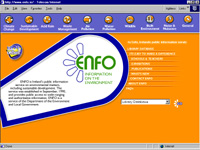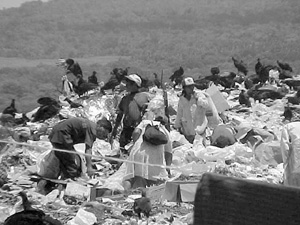Features Links
Advising Students Student Councils
Student Councils  Junior Press
Junior Press Environmental Issues
 Wild Ireland
Wild Ireland Rubbishing Ireland
Rubbishing Ireland Issues of Concern
 Children's Rights
Children's Rights  Child Labour
Child Labour  Child Slavery
Child Slavery  Anorexia Nervosa
Anorexia Nervosa Educational Issues
 Learning the Internet
Learning the Internet  History Stuff
History Stuff  What is Quidditch?
What is Quidditch? Getting Involved
 Paths to Peace
Paths to Peace  Concern Debates
Concern Debates  Goal Link
Goal Link  The Asgard
The Asgard Music
 JJ72
JJ72  Napster
Napster  Eminem
Eminem Sport
 Basketball Finals
Basketball Finals News
 Nationwide News
Nationwide News Recycling our rubbish is an important aspect of how we take care of our environment. Kevin O'Connor and Jean-Christophe Izart from Cyclope Recycling examine Ireland's waste crisis. More information can be obtained from ENFO, Ireland's information service for environmental matters.
Recycling our rubbish is an important aspect of how we take care of our environment. Kevin O'Connor and Jean-Christophe Izart from Cyclope Recycling examine Ireland's waste crisis. More information can be obtained from ENFO, Ireland's information service for environmental matters.A Changing World
One of the consequences of Ireland's new found wealth has been a dramatic increase in both consumer-spending power and our production of waste. Rubbish collected by local authorities doubled between 1984 and 1998. 'Waste' refers to any unwanted material (solid, liquid or gas) that is disposed of - one person's waste may be another person's resource. There are many sources of waste including agriculture, industry, commercial activities and households. In Ireland, local authorities collected 1.85 million tonnes of waste from the last two sources in 1998.Alongside this increase in waste generation is our difficulty in disposing of it. In the past rubbish was either dumped into the soil (landfill), the air (incineration) or water. As a member of the EU we are now committed to enforcing the waste pyramid that seeks a 'sustainable' approach to waste management. 'Sustainable' in this context refers to the conserving valuable resources for future generations. The top of the pyramid is prevention, then re-use, recycling, energy recovery (burning rubbish for heat) and finally waste disposal forms the base. The EU attempts to enforce this view through directives, effectively laws that require members to meet certain standards. In Ireland, the Environmental Protection Agency (EPA) is the body responsible for ensuring our compliance with these directives.

One person's rubbish is another's resource. This land-fill
outside Manila, Philippines, supports 20,000 people.
Ireland: Home Truths
Currently, 92% of commercial and household rubbish in Ireland goes to landfills, just 8% is recovered. Some of this waste consists of glass, plastic and paper, items that are easily recycled. In 1998 just 14.7% of paper waste, 30% of plastic and less than 5% of plastic was recovered. Along with Great Britain, we have the worst record in Europe for recycling or recovery of waste. As an example, paper waste from packaging has risen from 400,000 in 1993 to 700,000 tonnes by 1998. But, during this time, the percentage of packaging waste that is recycled has changed little and now stands at 14%. The EU has set targets for the recovery of this stream - most nations have been set targets of 50%, but Ireland, Greece and Spain have been set a lower target of 25% because of our low recovery rates. However, at the current rate of retrieval we will fail to make even this, lower, target. Ireland's pyramid is standing on its head!We are quickly running out of landfill space around the country. While modern landfills are better than older ones, nobody wants to live next door to a rubbish dump. Ireland is now at a crisis point. By contrast, the majority of our mainland European neighbours recognised many years ago that the reduction and management of waste was essential to sustain the health of humans and that of the environment.
A Look on the Bright Side
There are many in Ireland who are keen to change this picture. Some examples are:- Rehab provides nation-wide glass and aluminium recycling.
- Superquinn and Tesco promote the use of reinforced plastic bags for reuse.
- IBC computer company collect used print cartridges as part of a fund raising activity for the National Council for the Blind of Ireland.
- Cyclope recycling (www.cyclope-ireland.com) was set up in 2000 to promote sensible re-use and recycling of materials and to collect and recycle office paper in University College Dublin that was destined for landfills.
- Repak is a not-for-profit limited company set up as Irish industry's response to the obligations placed on Ireland by an EU Directive. The Green Dot is a European wide symbol appearing on packaging that indicates the supplier of the packing is funding the recovery and recycling of packaging waste. However, not everybody has signed up for this campaign.
The Future
In many respects our environmental future is controlled by the EU. In December 1998 the government set out targets for the next 15 years. Among the targets were the following:- A diversion of 50% of overall house waste away from landfill
- A minimum 65% reduction in biodegradable waste consigned to landfill
- Recycling of 35% of municipal waste
- Recycling of at least 85% of construction and demolition waste
Where can I find Information?
Probably the best place to find information is from ENFO. This is Ireland's information service for environmental matters. ENFO is a service of the Department of the Environment and local Government. You can check out their website. They also have a cool office open to the public at 17 Andrew Street, Dublin 2.The practical approach: what can you do?
- Re-use durable bags for shopping.
- Buy products with a low amount of packaging and look for the Repak sign.
- Use your local recycling centre, bottle bank and can bank.
- Use products made from recycled materials or paper from sustainable forests
- Use biodegradable products
- Get your school to organize a recycling campaign.


Htoo Twins

Asgard

Napster